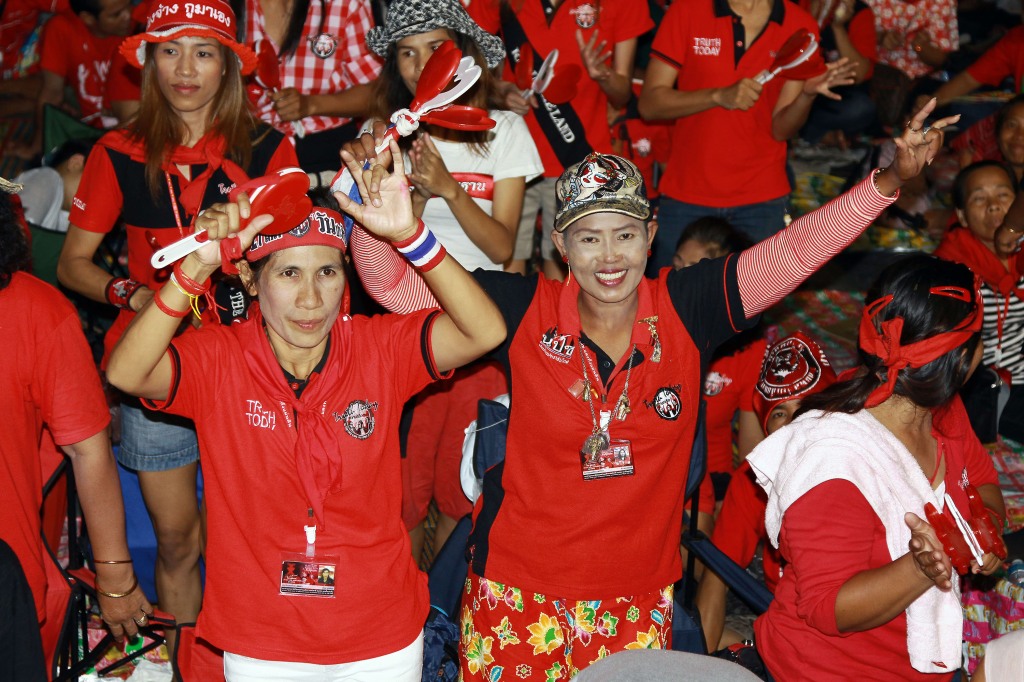Thailand: Return of the Red Shirts -- big protests mark massacre anniversary
A huge crowd mobilised at Ratchaprasong Intersection to mark four months since the May 19 massacre of pro-democracy protesters. Video by Richard Barrow.
By Thailand Troubles and Peter Boyle
Thailand: September 19 coup, four years on... bloodbath at Ratchaprasong, four months later

Red Shirts on April 19, 2010, before the military attack.
Thailand: Thousands demand release of political prisoners (+ photo essay)

[See also "Thailand: Red Shirt protests on the rise again". For more on the Thai people's struggle for democracy, click HERE.]
By Peter Boyle
September 18, 2010 -- Up to 3000 members and supporters of the United Front for Democracy against Dictatorship (UDD) – popularly known as the Red Shirts – rallied peacefully outside Klongprem Remand Prison in Bangkok on September 17 to demand the release of the estmated 470 political prisoners held since the military violently suppressed the mass Red Shirt protest camp in Bangkok on May 19.
The protesters laid wreaths of red roses at the gates to the prison. Similar protests were held outside several other prisons around the country.
¡Viva la Revolución!: The 1910 Mexican Revolution (part 2)

A 1938 painting depicts Lázaro Cárdenas giving land to the peasants.
Burma: Asian left parties condemn attacks on workers' rights
Statement initiated by Working People Association (Indonesia) and Network of Progressive Youth Burma
[If your organisation would like to sign, please email:international@prp-indonesia.org.]
September 16, 2010 -- We, the undersigned organisations, strongly condemn the military junta of Burma for its new decree to curb workers’ right to form trade unions and its harsh punishments against any industrial action.
The military junta of Burma -- the State Peace and Development Council (SPDC) -- decreed a new regulation on August 20, 2010, at a meeting in Rangoon attended by industry employers, government ministers and Burmese military officials, including Lt-Gen Myint Swe of the ministry of defence. It stated that, whoever launches or participates in industrial protests demanding better rights or conditions will be fired and blacklisted. The reason for the decree, labour activists in Burma believe, is that the junta wants to prevent further industrial action and employers don’t want their workers taking action to demand better wages, so now they can fire those who protest and stop them from getting jobs elsewhere.
Thailand: Red Shirts allege military behind activist killings

Krissada in Chiangmai hospital ICU. Photo by Ruangsil.
[See also "Thailand: Red Shirt protests on the rise again". For more on the Thai people's struggle for democracy, click HERE.]
By Peter Boyle
September 16, 2010 -- Chiangmai, in Thailand’s north, is considered to be a Red Shirt stronghold. On August 29, a 21-year-old local Red Shirt (popular name for the United Front for Democracy against Dictatorship, UDD) activist “James” Krissada Klaharn and his girlfriend Nongnuch Kampor were driving home at about 1.15 am after a long day selling popular stickers at a roadside stall, when the killers struck.
Nongnuch was driving. They noticed a vehicle, with headlights off, following them. Suddenly the vehicle accelerated, pulled alongside and sprayed their cars with bullets. Krissada was hit in the legs, abdomen and shoulder.
Namibia: A trust betrayed – again?
[The following article first appeared in AfricaFile's At Issue Ezine, vol. 12 (May-October 2010), edited by John S.
Cuba: Exporting revolution, revolutionary models and historical facts
"I asked him [Fidel Castro] if he believed the Cuban model was still something worth exporting". -- Jeffrey Goldberg, the Atlantic blog, September 8, 2010
"In their ravings they pretend that Cuba is an exporter of revolutions. In their sleepless business and usurers' minds they believe that revolutions can be sold and bought, rent or lent, export or import as one more merchandise". -- Fidel Castro, February 4, 1962
`Orientalism' and Cuba: How Western media get it wrong
By Tim Anderson
Disaster management: New Zealand, Haiti and the ‘Cuban way’

Earthquake damage in Christchurch.